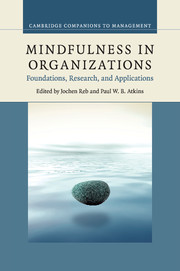Book contents
- Frontmatter
- Contents
- List of figures
- List of tables
- List of contributors
- Foreword
- Preface
- Part I Foundations
- Part II Research
- Part III Applications
- 14 Awakening at work: introducing mindfulness into organizations
- 15 Teaching managers to manage themselves: mindfulness and the inside work of management
- 16 Mindfulness in coaching
- Index
- References
14 - Awakening at work: introducing mindfulness into organizations
from Part III - Applications
Published online by Cambridge University Press: 05 July 2015
- Frontmatter
- Contents
- List of figures
- List of tables
- List of contributors
- Foreword
- Preface
- Part I Foundations
- Part II Research
- Part III Applications
- 14 Awakening at work: introducing mindfulness into organizations
- 15 Teaching managers to manage themselves: mindfulness and the inside work of management
- 16 Mindfulness in coaching
- Index
- References
Summary
Introduction
In this chapter, I discuss implementing mindfulness into organizations, with emphasis on Monsanto and Google as examples. I summarize research by the Center for Contemplative Mind in Society conducted from 2000 to 2004 and published in 2004 on early attempts at forming contemplative organizations. I discuss not only the benefits for individuals and organizations but also how each organizational culture requires different framing and language. I also discuss concerns from the dharma community that introducing mindfulness encourages organizations, especially corporations, to continue unwholesome practices by helping employees be more content with their work. This chapter proposes that mindfulness and related practices can lead to insight and then to wisdom and compassion, encouraging new forms of inquiry and creativity, potentially taking organizations and their leaders from good to great and from great to wise and compassionate. The chapter suggests that future research is needed to explore and document the transformative impact of mindfulness training on both the individual and the organization.
History
The exploration of the integration of mindfulness practices into corporate settings described in this chapter began when the Center for Contemplative Mind in Society – which I co-founded with two foundation presidents, Charles Halpern (Nathan Cummings Foundation) and Robert Lehman (Fetzer Institute) – carried out a search for organizations that were using these practices. I had first studied mindfulness in 1970 with the Burmese teacher S. N. Goenka, a pioneer in the introduction of secular mindfulness, in Bodh Gaya, where the Buddha had been enlightened, and then studied with Tibetan teachers including Kalu Rinpoche, Gelek Rinpoche, and Tsoknyi Rinpoche. I had also taught mindfulness at retreat centers across the United States and had introduced the practice to the sixty-five employees of Illuminations, Inc., a company I co-founded in Cambridge, Massachusetts in 1978. So I was enthusiastic about introducing mindfulness to mainstream organizations.
- Type
- Chapter
- Information
- Mindfulness in OrganizationsFoundations, Research, and Applications, pp. 333 - 354Publisher: Cambridge University PressPrint publication year: 2015
References
- 5
- Cited by

